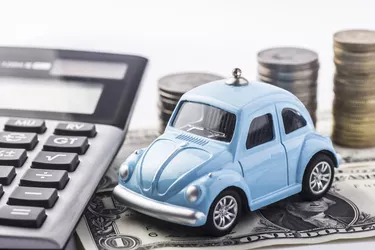
About 85 percent of consumers finance the purchase when they buy a new car, according to Debt.org. Approximately 37.5 percent do the same when they buy used cars. It can be a big decision because you're most likely committing to a loan for anywhere from two to seven years, but not everybody has disposable cash on hand to buy a vehicle.
Your monthly payment will depend on three critical components: how much you borrow, how long you take to repay the loan and your interest rate. The average new car loan is $34,635 in 2021, with an average monthly payment of $563 spread out over 70 months. Should you borrow less to get that payment down?
Video of the Day
Video of the Day
Qualifying for the Loan
Qualifying for a car loan comes down to your credit score, but your choice between a small loan and a hefty one might not depend on this factor alone. Just because someone is willing to give you that money doesn't mean that it's affordable for you. Take a good, honest look at your existing monthly budget. Can you squeeze a $600 car loan into it without feeling the pinch? You might want to go for a smaller loan if your answer is no.
The Down Payment Factor
The size of your loan doesn't necessarily equal the amount you're borrowing. You're borrowing the car's price less your down payment or the trade-in value of your existing vehicle. On one hand, you can reduce that loan payment – maybe even significantly – by emptying out your savings account so you're borrowing the smallest amount. But this means that you won't have that savings account standing by in case of emergency.
The flip side here is that you could easily end up owing more than your car is worth if you make a piddling down payment and take out a loan for the largest amount, always assuming that you qualify to do so. New cars depreciate very quickly – to the tune of about 10 percent – the moment you drive those wheels off the car lot. You could end up owing $25,000 on a car valued at $22,500 in a blink of an eye. It will depreciate another 10 percent over the course of the first year.
Consumer Reports recommends putting at least 20 percent down, if possible, to hedge against depreciation, always assuming that you're not depleting your savings in order to do so.
The Effect on Your Credit Score
First, the good news: The size of your auto loan is not going to have a direct effect on your credit score. Car loans don't count toward your oh-so-critical credit utilization ratio, the number that measures how much of your available credit you've used up at any given time. This number applies to loans like credit cards. The size of your auto loan is neither good for your credit nor bad for your credit, at least not in and of itself.
And you don't have to worry too much about dinging your credit by applying for several loans at once to compare their terms. They should all count as just one credit inquiry if you apply to all within a short window of time, 14 to 45 days or so, provided that each of the applications is for an auto loan.
But the size of your loan and your monthly budget still come into account. Your credit will be affected if you fail to make any car payments during the life of your loan. And it can be a lot harder to scrape together $600 in a given month rather than $300 if you lose your job or become seriously ill, particularly if you've spent your emergency savings to make a significant down payment on those wheels.
It all comes down to strategy. How willing are you to roll the dice? The right size of your car loan can depend a good deal on whether you want to be safe rather than risk being sorry.
- Consumer Reports: 7 Costly Misconceptions About Car Loans
- Consumer Financial Protection Bureau: How Should I Decide How Much I Can Afford to Borrow for an Auto Loan?
- Debt.org: Auto Loans – New and Used Financing Options
- Greater Texas Credit Union: Understanding Car Loan Length
- Consumer Reports: How to Get the Best Car Loan
- Lending Tree: Average Car Payment/Loan Statistics2021
- Credit Union of Southern California: How Much Will a Car Loan Drop My Credit Score?